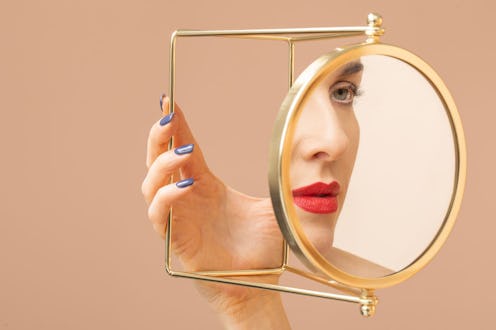Style
These Smart Mirrors Can Tell You If Your Skincare Routine Is A Total Waste Of Money

Lighting plays a big part in your reflection. Makeup can look completely different in artificial lighting versus natural sunlight, occasionally leaving you with unsightly orange streaks. But what if there was a device that could mimic daylight at any time? That could even analyse your skin and tell you if all your expensive products are really worth their price tag? Well, such a device now exists. But what exactly are smart mirrors?
To the naked eye, these devices look like a traditional mirror. But step in front of them and their technological capabilities soon come to light. Some are simply designed to provide you with a huge range of light settings, so you can look flawless on the bus and under the harsh conditions of your office meeting rooms.
Others go a little deeper, scanning your skin for any potential issues, alerting you to said issues, and offering tips to remedy them. You can even input details of your usual skincare routine and find out if it's helping or hindering your complexion.
A quick Google search will claim that these high-tech inventions are the future of the beauty industry. These claims may well be true — if the mirrors can live up to their promises, that is.
A few are already available to buy. HiMirror is a widely discussed company. Its mirrors act like an at-home dermatologist, analysing both your skin and skincare routine. The former can be done in a single photo. The results will give you a percentage and a rating ranging from "poor" to "excellent", focusing on aspects like roughness, dark spots, red spots, fine lines, and pores.
You can also set and track specific skincare goals and input every product that you currently use to keep an eye on whether your creams and serums are benefitting your skin. The mirror even gives personalised advice on everything from good and bad ingredients to the steps you should be incorporating into your everyday regime. Prices start from just over £200.
Another mirror range currently available in the UK is simplehuman. These mirrors (which range from a wide three mirror set-up to a small compact design) focus more on makeup, rather than skincare. The company's lighting system replicates natural sunlight no matter where you are and magnifies skin so you can perfect the tricky stuff like eyebrows and eyeliner.
An app accompanies the mirror. Download it and you can capture any light setting that you want the mirror to simulate, from a super bright workplace to a dimly lit restaurant. Other features of the most expensive mirror (£299.99) include a flashing alarm system to let you know when you're running late and the ability to last for three weeks on a single charge.
Other inventions are in the works. CareOS' Artemis mirror was unveiled at the 2019 CES technology show. With a holistic aim, it can recognise different faces, analyse and magnify skin, allow you to virtually try on makeup, and play hair and beauty tutorials. If that wasn't enough, the mirror can also track eye health and air quality and let you make calls and reservations. According to the company, it and the entire "connected bathroom" technology will be available later this year for $20,000 (around £15,000). Gulp.
Although these mirrors are yet to enter the mainstream, consumer psychologist Kit Yarrow told Allure they are the perfect device for today's image- and data-obsessed culture. "We have an unquenchable thirst for knowledge about ourselves," she said. "People want to know all of the minutiae, from how many steps they take in a day to what's going on when they sleep to the types of food they can tolerate to their genetic makeup. There's no end to the obsession. And this new beauty technology fits right into that mentality."
Personally, I'm of two minds. Understanding your skin health and the value of your daily routine is definitely useful, but being able to look at your face in microscopic detail could lead to people fixating over things that they would previously never have noticed. Plus who's to say everyone won't start obsessing over their skin condition percentages and competing for the top score?
With these kinds of purchases, there really is a lot to mull over.